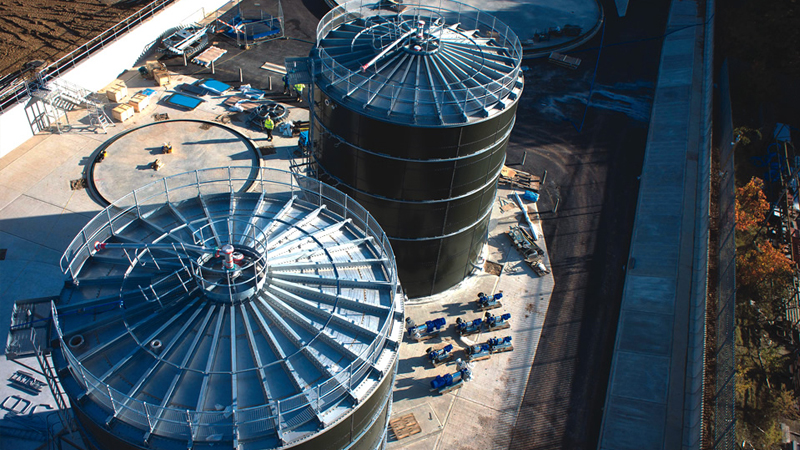Charlotte Morton
Financing remains a challenge for any anaerobic digester (AD) developer, but the hurdles in the United Kingdom are probably lower now than they ever have been. Understanding of AD has increased, and the technology has demonstrated its viability and ability to produce attractive, steady returns for investors. The Anaerobic Digestion and Biogas Association (ADBA) in the UK spoke to some experts in the AD financing market to get their views about the changing landscape.
ADBA’s finance arm, Compass Renewables, is led by Director Bruce Nelson. Compass offers advice to ADBA members on business planning, grant applications, debt arrangements and equity and developer funding for projects at the conceptual stage to those at more advanced stages of planning. “The finance market for AD has generally improved over the last couple of years,” observes Nelson. “It is still tough for the single site smaller scale projects unless these projects have adequate security. Instances where developers have managed to secure investment for a series of AD plants are principally a result of private equity with some interest from specialist debt funds.”
Nelson adds that these private equity firms have done their research, and understand the market and the relationship with the developer who is building several plants. “This makes AD an attractive opportunity,” he says.
ADBA also interviewed a leading UK commercial bank about why banks are interested in AD investment. Our contact indicated that the opportunity is interesting where it integrates well with an existing business such as on a farm: “We have viewed requests to fund AD with caution over the past few years, but have also seen it as an opportunity given the aspirations of the coalition government and the support of ADBA and other organizations to increase the capacity of AD in the UK. Reasons for caution have included concerns over how loans for AD are structured and the level of due diligence required, the requirement for more active management than is seen in other forms of renewables, the relative novelty of the technology and process and the difficulty in agreeing on long term feedstock contracts.
“Yet over time it has become apparent that AD is a way of winning new business, particularly in the agriculture sector. And we have become more experienced. With the benefit of a strong asset base that many farming businesses have, the levels of diligence have reduced and it is clear that plant management and operator skills can be brought in, although the requirement for some level of project evaluation remains.”
Green Investment Bank
The investor market is also supported by the interest of the UK Green Investment Bank (GIB), which invests in “projects that are both green and commercial” as part of its mission to help transition the UK to a green economy. The bank — established by the government — has identified waste as a priority sector for its investments, appreciating the potential for anaerobic digestion to deliver against the bank’s mandate to deliver sustainable green growth. It provides equity capital to new construction sites through its fund managers (Foresight and Greensphere), and is also seeking to provide senior debt to the more established AD players. The GIB expects to have provided more than £20 million ($33.9 million) of capital to the AD market by mid-year 2014 across four AD projects, with a total mobilized capital in excess of £50 million ($84.7 million).
ADBA asked Dominic Noel-Johnson, Senior Associate, UK Green Investment Bank plc, what it is about the UK AD market that makes it attractive from an investor perspective and how it is anticipated to develop: “The UK AD market is an attractive and growing investment opportunity and one where the projects themselves provide the valuable services of processing waste streams as well as generating electricity, heat and gas,” notes Noel-Johnson. “The market is also underpinned by a supportive and stable government incentive program and the Green Investment Bank believes that robustly structured projects can provide suitable economic returns for the risk/reward proposition.”
He adds that the GIB is committed to the UK AD sector. “We believe the market can provide an effective solution to farmers with an overcapacity of farm wastes (such as slurries) and to the waste industry for the treatment of food waste,” explains Noel-Johnson. “For example, the opportunity for a farmer to diversify income streams through the operation of an AD site, the ability to treat on-farm wastes, and generate electricity and heat as well as create a useable fertilizer from the digestate which the AD process produces is, in our view, an attractive closed loop proposition for the operator and an aligned investor.”
The GIB expects the market to continue to grow in the short to medium term. “We are starting to see a number of smaller scale AD opportunities appear which can provide more localized and appropriately sized solutions — especially to on farm and industrial producers of feedstock,” he notes. “We expect a number of gas to grid ADs to become operational over the next year, which will help move the AD sector and the UK’s gas grid into its next phase of development. … The Green Investment Bank remains highly supportive of this market and is intending to deploy more capital in both equity and debt instruments over the next 12 months.”
It is clear that the market for anaerobic digestion facilities is growing. The number of operating AD plants in the UK in 2010 was 54. In 2013, that grew to over 100, and today there are 145 facilities. And while there are signs the market is developing, the waste sector and merchant AD market is still very focused on equity. ADBA anticipates that as more plants come online and start operating, we may see more debt financing possibilities as established plants look to refinance.
Charlotte Morton is Chief Executive of the Anaerobic Digestion and Biogas Association (ADBA) in the United Kingdom.













